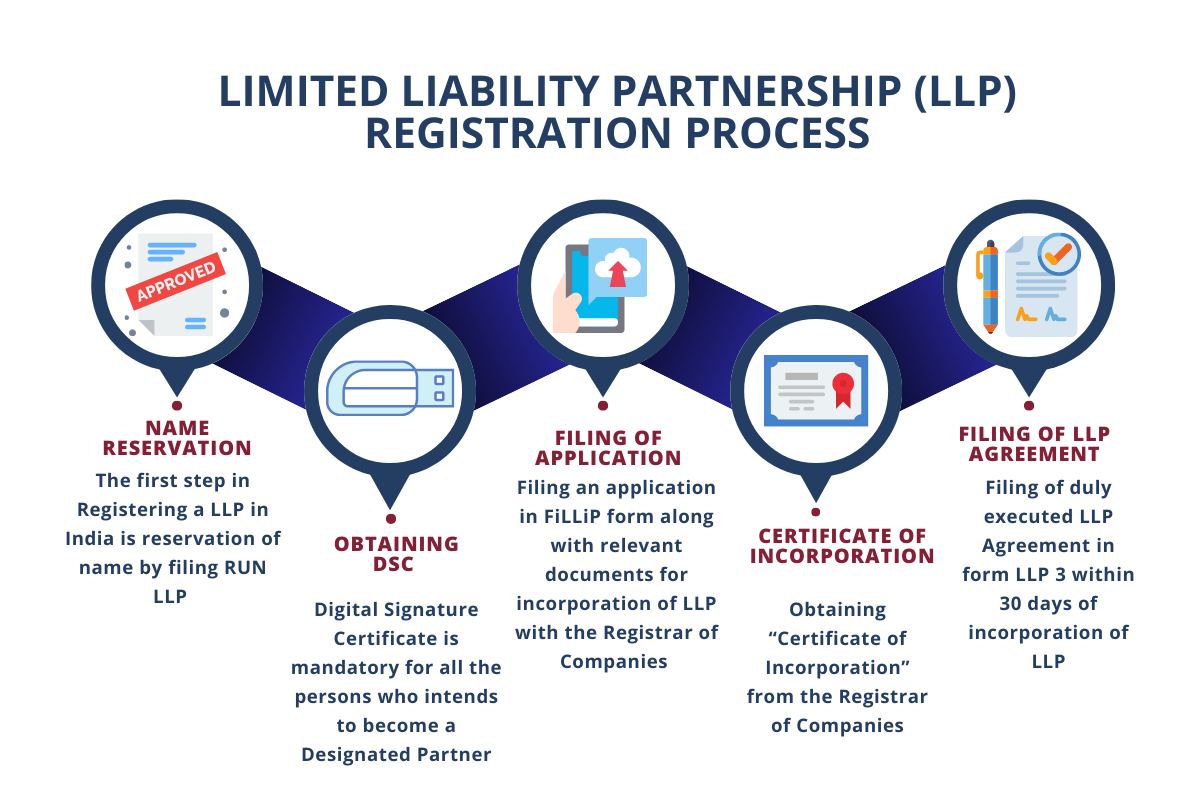Limited Liability Partnership Registration in Surat
Limited Liability Partnership (LLP) is a body corporate formed and registered under the Limited Liability Partnership Act, 2008 and is a legal entity separate from that of its partners. LLP has perpetual succession. Any change in the partners of LLP shall not affect the existence, rights or liabilities of the LLP.
Every LLP shall have at least two designated partners who are individuals and at least one of them shall be resident in India. In case of an LLP in which all the partners are bodies corporate or in which one or more partners are individuals and bodies corporate, at least two individuals who are partners of such LLP or nominees of such bodies corporate shall act as designated partners.
Minuimum Requirements for Limited Liability Partnership Registration in Surat
-
Minimum 2 shareholders
-
One of the Directors must be Indian Resident
-
DSC(Digital Signature Certificate) for two directors
-
Minimum 2 Directors
-
No Minimum Authorised Share Captial
-
The directors and the shareholders can be same person
-
DIN(Director Identification number) for 2 Directors

Documents Required for Private Limited Company Registration
- Copy of PAN (in case of resident)
- Copy of Passport (in case of non-resident)
- Copy of proof of identity (Voters ID/ Passport/ Driving License)
- Copy of residential proof (Bank Statement/Telephone Bill/ Mobile Bill/ Gas Bill), (Any one, not older than 2 months)
- Disclosure of interest in other entities*
- Consent Letter*
From Partner
- Copy of Sale deed/ Property Deed (in case of owned property) or Lease Deed (in case of rented premises)
- Copy of Telephone or Mobile/Electricity or Gas Bill of registered office (Any one, not older than 2 months)
- No-objection Certificate from the owner from the owner of the premises for its use as registered office
- Subscriber Sheet*
- LLP Agreement*
From LLP
Note 1: *Draft will be provided by our team
Advantages of a Private Limited Company Formation
Separate Legal entity
As a juristic legal person, both the company and its members have separate legal identity that is distinct from each other.
Perpetual Succession
A company existence is uninterrupted, even the death or insolvency of shareholder(s)/ directors cannot affect the continuity of business of the company.
Limited Liability
The liability of members of a private limited company is limited to the amount of share capital remaining unpaid on the shares held by them.
Easy transferability of ownership
The ownership in a private limited company is easily transferable by way of transfer of shares from one member to another subject to the restriction that the total number of members of a private limited company cannot exceed 200.
FDI Allowed
In Private Limited Comapny, 100% Foreign Direct Investment is allowed that means any foreign entity or foregin person can directly invest in a Private Limited Company.
Builds Cerdibility
The particulars of the company are the available on a public database. Which improves the cerdibility of the company as it makes it easy to authenticate the details.
Frequently Asked Questions
-
How many people are required to incorporate a LLP?
Minimum two people / partners are required to incorporate a LLP and there is no limit on maximum number of Partners. At least one of the people should be resident in India.
Explanation. For the purposes of this section, the term resident in India means a person who has stayed in India for a period of not less than one hundred and twenty days during the financial year.
-
Do I have to be present in person to incorporate a LLP?
No, you are not required to be present at our office or appear at any office for the incorporation of a LLP. All the documents can be scanned and sent through email and the original hard copy can be couriered to our office.
-
What do I need to quickly incorporate my LLP?
To incorporate a LLP quickly, make sure the proposed name of the LLP is very unique. Names that are similar to an existing company / limited liability partnership / trademark can be rejected and additional time will be required for re-submission of names.
-
What are the annual compliance requirements for LLP?
LLP is required to file Form 8 and Form 11 with the Registrar annually. Further, the financial statements of LLP are required to be audited in case its turnover exceeds Rs. 40,00,000 or capital contribution exceeds Rs. 25,00,000.
-
What is a Designated Partner Identification Number (DPIN)?
DPIN is a unique identification number assigned to all existing and proposed designated partners of a LLP. It is mandatory for all present or proposed partners to have a DPIN. DPIN never expires and a person can possess only one DPIN.
-
Who can be a Designated Partner?
Every LLP shall be required to have at least two Designated Partners who shall be individuals and at least one of the Designated Partner shall be a resident of India. In case of an LLP in which all the partners are bodies corporate or in which one or more partners are individuals and bodies corporate, at least two individuals who are partners of such LLP or nominees of such bodies corporate shall act as designated partners.
-
Is Foreign Direct Investment (FDI) allowed in LLP?
Yes, Foreign Direct Investment can be made by a person resident outside India on a repatriable basis in the capital of an LLP.
-
How can we apply for the reserved name of a LLP?
For reservation of name of a LLP, Form RUN LLP is required to be filed with the Registrar of Companies with two proposed names.
-
Are LLPs allowed to do any charitable business?
No, LLPs are only allowed to do any lawful business that is carried out with a view to earn profit.
-
Is an office required for starting a LLP?
Any commercial/industrial/residential premises can be used as a registered office of the LLP in India where communication from MCA will be received for the purpose of smooth functioning of the business.
-
What is a Digital Signature Certificate?
A Digital Signature Certificate (DSC) establishes the identity of the signee electronically while filing documents. The Ministry of Corporate Affairs (MCA) mandates that e-form(s) submitted on the MCA portal are digitally signed using DSC.
-
Can an existing partnership firm or company be converted to LLP?
Yes, an existing partnership firm or a company that is unlisted can be converted into LLP. There are many advantages to converting a partnership firm or a company into LLP.
-
Can a minor be appointed as a partner in a LLP?
The Designated Partner needs to be over 18 years of age and must be a natural person. Even foreign nationals can be appointed as a Partner. In case of an LLP in which all the partners are corporate bodies, at least two individuals who are partners of such LLP.
-
Whether a body corporate may be a partner of an LLP?
Yes, a corporate body can become a partner of a LLP.
-
Which sectors are prohibited by the Government for foreign investment?
Investment by person resident outside India is prohibited in certain sectors namely:
-
Lottery business including Government/ private lottery, online lotteries;
-
Gambling and betting including casinos;
-
Chit funds (except for investment made by NRIs and OCIs on a non- repatriation basis);
-
Nidhi company;
-
Trading in Transferable Development Rights (TDRs);
-
Real Estate Business or Construction of Farm Houses;
-
Manufacturing of cigars, cheroots, cigarillos and cigarettes, of tobacco or of tobacco substitutes. The prohibition is on manufacturing of the products mentioned and foreign investment in other activities relating to these products including wholesale cash and carry, retail trading etc. will be governed by the sectoral restrictions laid down in Regulation 16 of FEMA 20(R);
-
Activities/ sectors not open to private investment viz. atomic energy and railway operations;
-
Foreign technology collaboration in any form including licensing for franchise, trademark, brand name, management contract is also prohibited for Lottery business and Gambling and betting activities
-
-
What are the entry routes for making Foreign Direct Investment in India?
Foreign direct investment in India has mainly two entry routes- Automatic Route and Government Route. Automatic Route is the entry route through which investment by a person resident outside India does not require the prior Reserve Bank approval or Government approval.
Government Route is the entry route through which investment by a person resident outside India requires prior Government approval. Foreign investment received under this route shall be in accordance with the conditions stipulated by the Government in its approval.
Download

Download Business Guide
This guide provides detailed information about the India Ecosystem, tax structure, major compliance etc. It helps entrepreneurs understand how to start and grow their business in India.

